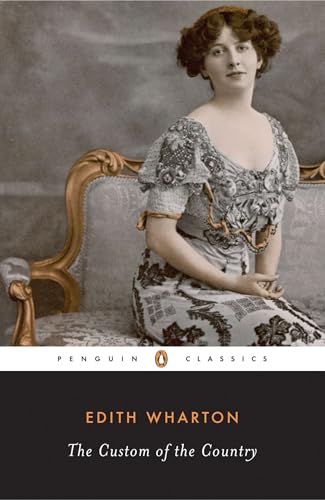The novel I read this year that most stuck with me is Edith Wharton’s The Custom of the Country. This is the middle child of the New York novels, so-called, bookended by its more famous siblings, The House of Mirth and The Age of Innocence. It is, in some ways, the least distinguished of these books—less comic than The House of Mirth, less of an obvious masterpiece than The Age of Innocence. And yet, in its villainous heroine, Undine Spragg, it captures something about the American spirit better than the other two books, something that feels exceptionally relevant in 2020.
Custom describes Undine’s journey, from small town Apex (allegedly Midwestern although all of the improbable Apexian names sound Appalachian to my ear: Undine Spragg, Elmer Moffatt, Indiana Frusk) to the social heights of New York City and Paris. Determined to live in the manner she feels she deserves, Undine marries and marries again, parlaying the modest old Manhattan pedigree of her first husband into the aristocracy of her second into the robber baron wealth of her third, and beyond. Along the way, she has a child she doesn’t care about, occasions a suicide, and drains her poor parents of both their money and psychic essence, but such is the price that must be paid for an ultimate victory that keeps just retreating over the horizon.
Undine is that rare literary protagonist, not merely antiheroic but fiercely unlikable, even loathsome at times. Her only slightly admirable quality is a doggedness, an absolute refusal to yield to circumstances, to accept her place or her destiny. That the book succeeds is a testament to both Wharton’s powers as a comic novelist, as well as the satisfaction of watching a woman from the sticks get the best of a patriarchal society too decadent and shallow to stop her. She is, after all, that society’s apotheosis, and she wields her amoral shamelessness as a kind of superpower. Sound familiar?
A large part of Custom’s power and readability owes to the intelligibility of Undine’s character as an American type. It is a type, of course, embodied by the villains of our age: our former president, determined to create an alternate reality in which he never lost and never can lose; the world’s richest man, determined to win a grim global game of Monopoly. Undine, and those like her, operate with the strategic and moral vision of a virus—they exist only to spread and multiply. To ever stop is to die.
It is that fabled thing, the spirit of American individualism, gone horribly sick; or, one might well argue, it is simply that individualism perfected. At the marvelous end of The Custom of the Country, Undine has persevered and married Elmer Moffatt, a kind of hick gilded-age Bezos. She has everything she ever wanted and more… except the prospect of becoming an ambassador’s wife, genteel political success being the one victory out of Moffatt’s grubby grasp, and so our heroine must begin joylessly moving toward that next thing. In imagining Moffatt’s crudeness as an impediment to or disqualification from political life, Wharton dates herself, but in every other sense her subject is one for the ages. The Undine Spraggs have always been among us, little mutant strands of our fragile national DNA waiting to spread, despoil, and destroy.
More from A Year in Reading 2020
Don’t miss: A Year in Reading 2019, 2018, 2017, 2016, 2015, 2014, 2013, 2012, 2011, 2010, 2009, 2008, 2007, 2006, 2005









